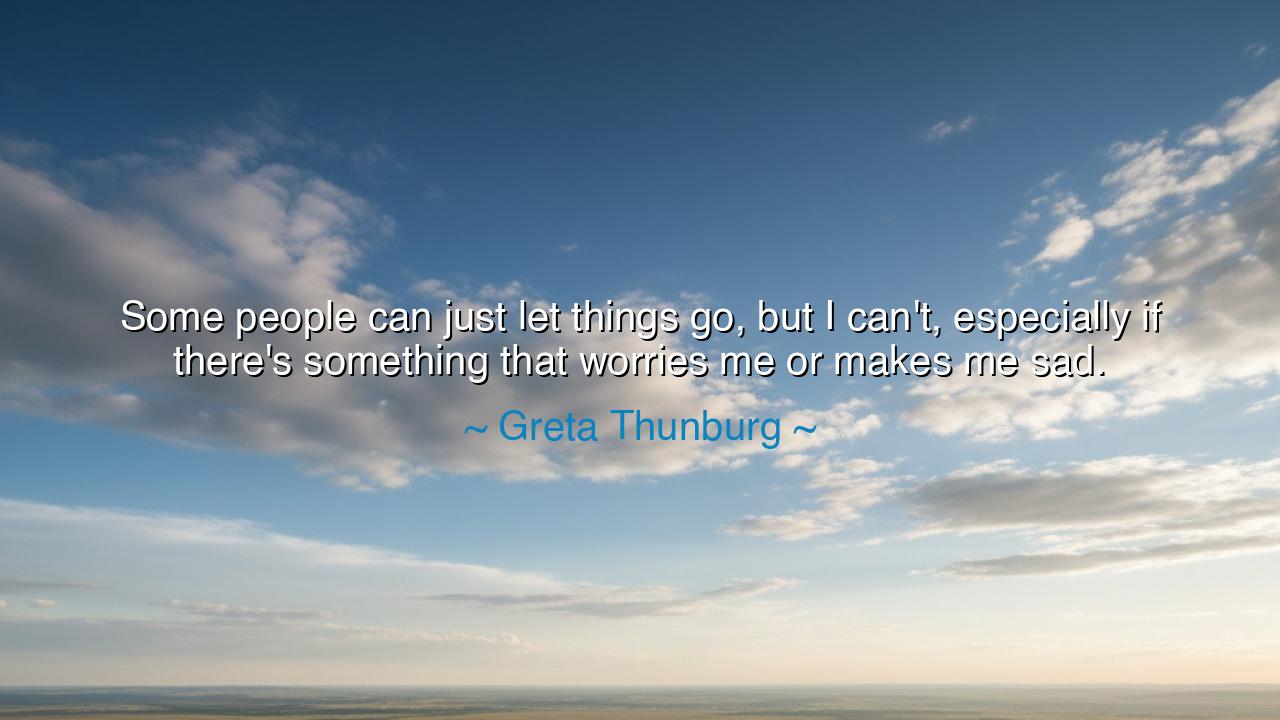
Some people can just let things go, but I can't, especially if
Some people can just let things go, but I can't, especially if there's something that worries me or makes me sad.






There is an intensity of truth in the words of Greta Thunberg, who said, “Some people can just let things go, but I can’t, especially if there’s something that worries me or makes me sad.” In this confession lies not weakness, but deep moral fire — the heart of one who refuses to become numb to the suffering of the world. These words speak not only of emotion, but of conviction — of the sacred burden carried by those whose spirits are too awake to turn away. Thunberg’s statement is the voice of every prophet, poet, and reformer who has ever lived — those who could not “let things go,” because their hearts were too alive to indifference.
The origin of this quote can be traced to the very essence of Greta Thunberg’s being — a young woman whose concern for the planet has transformed into a global call to action. From an early age, she was not content to observe; she felt. When others saw environmental collapse as distant or abstract, she saw the sorrow of a dying Earth as personal and immediate. Her words reveal not anxiety alone, but empathy — the kind that pierces the surface of convenience and comfort. For Greta, worry is not idle fear; it is love in its most urgent form. To be moved by sadness is not to be broken by it — it is to be human in the highest sense.
The ancients spoke often of those who bore the burden of awareness. The Hebrew prophets cried out in anguish because they saw the truth others ignored. The philosopher Socrates drank his hemlock because he would not let falsehood go unchallenged. Even Buddha, before he became enlightened, was moved to leave his palace because he could not “let go” of the suffering he saw around him. In each of these souls burned the same restless compassion — a refusal to accept what is wrong simply because it is easier to forget. Greta’s inability to let go is not a flaw of spirit; it is its refinement — the mark of one who feels deeply enough to seek change.
There is also something profoundly courageous in her vulnerability. When Thunberg admits that she cannot let things go, she is revealing the cost of caring in a world that often rewards apathy. To feel deeply is to hurt deeply, and yet, it is from this hurt that the world’s greatest healers are born. The artist, the activist, the teacher, the mother — all those who nurture and protect — must carry within them this same tension between sorrow and duty. Greta’s sadness is the soil from which her action grows. Like fire, it consumes, but it also purifies.
Consider the life of Florence Nightingale, who walked through the horrors of war, surrounded by pain and death. Others could look away; she could not. Her empathy would not allow her to rest until she had transformed her sorrow into service, her grief into healing. Out of that refusal to “let go,” modern nursing was born — a discipline rooted in compassion. So too does Greta’s grief drive her to raise her voice for the Earth, turning sadness into strength, helplessness into hope. This is the eternal pattern of the sensitive soul — that from the weight of care comes the power of creation.
Her words also carry a warning to those who pride themselves on indifference. To “let things go” may seem wise when the matter is small, but when the matter is grave — when the air is poisoned, the oceans rise, or justice is denied — apathy becomes a sin of the spirit. The ancients taught that the one who feels sorrow for the world bears the light of the gods within them, for such sorrow springs from compassion. To feel nothing is easy, but to feel deeply is divine. Greta’s inability to let go, then, becomes not a weakness to overcome, but a strength to honor.
The lesson, my children, is this: do not be ashamed of the weight you carry. If something worries you, do not bury it; transform it. If sadness touches you, let it teach you tenderness. Do not envy those who drift through life untouched — for the heart that feels nothing builds nothing. Instead, learn to harness your emotion as a force for good. Let your concern guide your hands, let your sorrow become a song, let your unease awaken courage.
For as Greta Thunberg shows us, the soul that cannot let go of what is wrong becomes the one that moves the world toward what is right. It is not the indifferent who change history, but the restless — those who care too much, think too deeply, and feel too strongly. So embrace your worry. Honor your sadness. They are signs that you are still alive, still connected, still capable of love. And from that love — fierce, patient, and unyielding — all healing begins.






AAdministratorAdministrator
Welcome, honored guests. Please leave a comment, we will respond soon